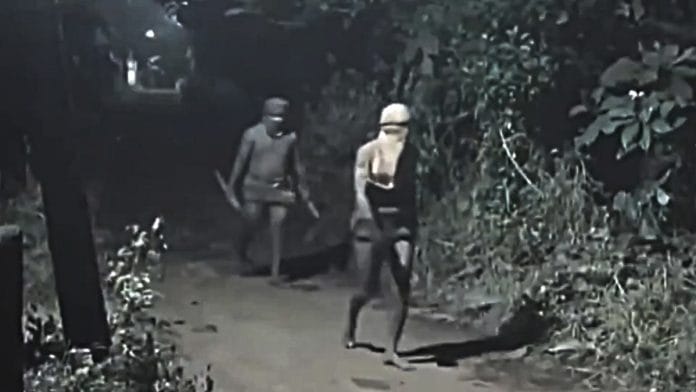Chennai: The village of Mannanchery, by the shore of Vembanad Lake in Kerala’s Alappuzha district, was suddenly rattled by a botched robbery on the midnight of 29 October.
The back door of a local resident’s house was destroyed in a clear sign of a break-in—and although the resident, Renuka Ashokan, confirmed nothing was stolen, it was enough to set alarm bells ringing in the village.
Local police examined footage from nearby CCTV cameras the following day and identified the images of two half-naked men with their faces covered and a sickle-like weapon in their hands as they walked down the street.
That was not all. In the coming week, local police received two more complaints: one involved the theft of a 3.5 sovereign gold chain from a house and the other was a theft in which some imitation jewellery was stolen.
Similarly, two attempted theft cases were reported from Punnapra, nearly 20 km from Mannanchery, Mohit P.K., inspector of police at the Mannanchery station, told ThePrint.
As panic set in, police noticed that all the cases had one thing in common: the crime scenes showed a similar method of breaking in through the back door.
This led Alappuzha police to suspect the involvement of a group of robbers from neighbouring Tamil Nadu, known as the ‘Kuruva Gang’, which is known for typically entering homes through the back door.
“They have a fixed modus operandi. I arrested some members in 2012 and 2018 in theft cases. So, we had some speculation,” Deputy Superintendent of Police Vijayan T.B. told ThePrint.
“They smear oil all over their body to slip away once captured… Once they rob one house, they will immediately attempt robberies in neighbouring houses,” he added.
He said state police also suspected the involvement of the gang in similar theft cases in the neighbouring Ernakulam district.
Acting on a tip-off from members of the same gang in Tamil Nadu’s Kamakshipuram in Tiruchy district, police arrested a suspect named Santhosh Selvam from under the Kundannoor Bridge in Ernakulam. The operation involved a four-hour-long search with a scuba team from the Fire and Rescue service unit.
The ‘Kuruva Gang’ is an unorganised group without a specific leader and is known for its distinctive method of robbery. Mostly originating from Tamil Nadu’s Tiruchirappalli district, the gang gets its name from the indigenous nomadic Narikkurava or Kuruva community, from which its members were usually drawn in the past.
Members of the gang have been arrested in many theft cases in both Kerala and outside for over a decade. The most recent arrest involved five members who were apprehended in Delhi for their alleged involvement in the theft of cash and a laptop at the pre-wedding events of Mukesh Ambani’s son, Anant Ambani, on 12 February.
Vijayan said gang members usually worked in teams of two while robbing places to escape easily if captured. The team members each carry one weapon, have names tattooed on their chests—in the case of one suspect who was arrested, it was his wife’s name—and do not hesitate to attack people, he said.
Also read: Sri Lanka has arrested ‘nearly 500’ Tamil Nadu fishermen this year, twice as many as in 2023
Arrests in the past decade
In the days after the robberies in Kerala, a special team of seven officers, led by Vijayan, was formed in Alappuzha to nab the gang members.
With Santhosh Selvam arrested, Vijayan’s team is actively working to capture the remaining 13 gang members suspected to be scattered across the state.
Selvam—accused in 30 criminal cases in different states, including 18 in Tamil Nadu—was caught hiding in a burrow-like structure covered with cloth inside a tent under the bridge. He tried to escape from custody but was recaptured just hours later. Vijayan said Selvam had played a part in the 29 October robbery in Mannanchery.
According to police officers, the gang members usually stay in a village doing menial jobs for weeks to identify the houses to loot. Former and senior members of the group train new recruits.
Vijayam said team members train each other to become thieves and originate from the Thiruttu Gramam, loosely translated as a village of robbers, in Tamil Nadu.
A retired Tamil Nadu police officer told ThePrint the gang’s members are not very active in the state, adding that they are highly literate and proficient in several languages, including French.
However, Tamil Nadu-based historian and writer Meenakshi Sundaram disagreed with labelling the entire community as robbers.
She said that though some communities engaged in robbery as an occupation in Tamil Nadu centuries ago, an entire community can’t be called robbers.
“It’s unscientific to call a community a community of robbers. It’s not acceptable,” the writer said.
(Edited by Sugita Katyal)






